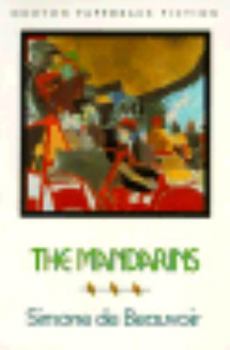The Mandarins
Select Format
Select Condition 
Book Overview
In her most famous novel, Simone de Beauvoir takes an unflinching look at Parisian intellectual society at the end of World War II, fictionally relating the stories of those around her--Jean-Paul Sartre, Albert Camus, Arthur Koestler, and Nelson Algren.
Format:Paperback
Language:English
ISBN:039330745X
ISBN13:9780393307450
Release Date:January 1991
Publisher:W. W. Norton & Company
Length:610 Pages
Weight:1.31 lbs.
Dimensions:1.3" x 5.4" x 8.0"
Related Subjects
Contemporary Fiction Genre Fiction Historical Literary Literature & Fiction World LiteratureCustomer Reviews
4 ratings
Memorable record of postwar Paris
Published by Thriftbooks.com User , 23 years ago
There are plenty of great books and films about the squalor of life during wartime, and even more about shellshocked soldiers coming to grips with life during peacetime. But surprisingly few novels deal with civilians faced with the task of rebuilding the devastated world around them. The Mandarins would have to be at the top of that very short list. Most critics, here and elsewhere, have tended to focus on the book as Beauvoir's record of her affair with Nelson Algren, but like all great artists, Beauvoir transforms the raw material of her life into something far more profound and encompassing, especially as it is played out against the grand, ruined backdrop of postwar Paris. The resulting book succeeds on so many levels: as roman a clef (Camus, Sartre, Koestler, and obviously Algren all feature prominently), as novel of ideas (of the "where do we go from here?" variety), as a love story (really two love stories--we can't forget Henri/Camus, whose story takes up half the book!), as a Jamesian exploration of brash New World vs. exhausted Old World culture, and finally as a portrait of an intelligent, civilized woman wrestling with her darkest impulses in the wake of Europe's darkest moment.Is the book overly long? Probably. Melodramatic? At times. Too cluttered with phrases of the "smiled knowingly" variety? Without a doubt. But it's redeemed time and again by the keen intelligence Beauvoir brings to bear on her characters and herself. For days after I put the book down, I found myself literally pining for the company of Anne, Lewis and Henri. Is there any greater testament to a novel than that?
Finding the Conflicts and Humanity in Existentialism
Published by Thriftbooks.com User , 24 years ago
The reason that I love Simone so much is defined in this book. What happens when you live with atrocities? What happens when you have to see lives terribly torn apart by evil? What can a person do?DeBeauvior takes these questions and makes them human, and gives hope to our world. But, with any great existentialist thinker, makes the point that living is hard. To exist well we must make choices and be able to live with them. All of the characters in this book show the angst and chaos of war. How they are able to live with each other and themselves is displayed with amazing depth and insight. The complexities of women are shown vividly - especially if you have read The Second Sex. Each of the woman characters are shown struggling with their societial place as Other, yet, show this trancendence that is even more important to her gender. This is also an incredible demonstration of the power and pain of love. I read this book as a teenager and found that I reread it at least once a year to remind me of the beauty and pain of life. It is a wonderful book about being a woman, and a thinker. I recommend it to anyone who is disturbed about events in this world and how to deal with them.
An eloquent account of moral and personal dilemmas
Published by Thriftbooks.com User , 26 years ago
Not only was Simone de Beauvoir a greater philosopher than her companion Jean-Paul Sartre, she was also a tremendously skilled writer. Both the philosopher and writer in de Beauvoir find their expression in this autobiographical novel. Although the subject matter (post-WW II France) may at first glance appear dry, some of the greatest minds of this century are captured in this account. Although readers may not be in as fateful positions as the characters in this book, they can relate to the many difficult decisions that the characters have to make, e.g. between personal principles and financial necessity, or the personal dilemmas faced in love and marriage. The Mandarins thus make very engaging reading on several levels. Some readers may want a peek into the private lives of de Beauvoir and Sartre, others may be more concerned about philosophical issues, some may want a slice of social history, and yet others may seek a book that is so well written that it is a joy to read even if one does not care for the subject matter. The Mandarins meets all these requirements. Hats off also to the translator, who has done an exceptionally good job in carrying de Beauvoir's writing skills accross the Atlantic.
Richest novel of postwar Paris ever written
Published by Thriftbooks.com User , 27 years ago
De Beauvoir was one of the greatest minds of this century. The sheer force of her intellect is overwhelming, but thankfully she was also an imaginative, honest, and often funny writer. The Mandarins has long been considered her masterpiece, and with good reason. A fictionalized account of a group of intellectuals struggling in postwar Paris, The Mandarins allows us the reader to peer into a world inhabited by fascinating, difficult, confused and life-affirming individuals. The novel deals with issues that still haunt France, indeed all of Western society, today; specifically the choices people made when the world around them became dominated by oppression, fascism, and the suppression of certain freedoms. How does one come to terms with the fact that atrocities occured under one's nose? How much freedom was taken away, and how much was given up voluntarily? Why is responsibility so important? And how does one act responsibly? Though existential in nature, the themes addressed in this book transcend labels. It is a painful struggle to accept one's freedom, and the responsibility it entails. The Mandarins show how different people come to terms with their conditions. The novel becomes all the more juicy because it is based on real people; Anne is de Beauvoir, Henri is Camus, Anne's husband is Sartre, Anne's daughter is de Beauvoir's lover. Apparently, the rich clothes designer who clawed her way to the top and collaberated with the Nazis is based on Coco Channel. De Beauvoir caused quite a stir with the publication of this novel; I imagine she must have ticked off alot of Paris "society"
Les mandarins Mentions in Our Blog

You Are What You Read
Published by Ashly Moore Sheldon • March 29, 2022
Here at Thriftbooks, many of us identify as book lovers. But, obviously, we don’t love all books equally. In fact, most of us gravitate toward a favorite genre or two. Does what you read say something about who you are? Read on to see what your favorite genre might reveal about you.





